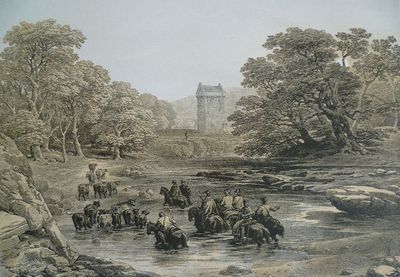Annotation:Plundering the Lowlands: Difference between revisions
No edit summary |
m (Text replacement - "garamond, serif" to "sans-serif") |
||
| Line 1: | Line 1: | ||
=='''Back to [[{{BASEPAGENAME}}]]'''== | =='''Back to [[{{BASEPAGENAME}}]]'''== | ||
---- | ---- | ||
<p><font face=" | <p><font face="sans-serif" size="4"> | ||
'''PLUNDERING THE LOWLANDS.''' AKA and see "[[Spraith of the Lowlands now Graze in the Glens (The)]]," "[[Plunder of the Lowlands now Graze in the Glens]]," "[[Crodh laoigh nam bodach]]" ([[Old Man’s Calf (The)]]). Scottish, Slow Air (3/4 time). A Dorian. Standard tuning (fiddle). AB. This tune "preserves the memorial of one of those predatory excursions which the Highlanders were in the habit of making to carry off the cattle of the neighboring low countries; considered, from the ignorance of the times, rather commendable as an act of prowess, than reprehensible as an act of aggression. He believes the air peculiar to his native country south of Loch Ness" (Fraser). See also note for “[[annotation:Crodh laoigh nam bodach]]” for more on this tune, for, despite Fraser's rather warlike version, seems to have been well-known as a simple crofting community cattle-driving song, sung when taking livestock to greener pastures. [[File:reivers.jpg|400px|thumb|right|Border reivers at Gilnockie Tower, from an original drawing by G. Cattermole]] | '''PLUNDERING THE LOWLANDS.''' AKA and see "[[Spraith of the Lowlands now Graze in the Glens (The)]]," "[[Plunder of the Lowlands now Graze in the Glens]]," "[[Crodh laoigh nam bodach]]" ([[Old Man’s Calf (The)]]). Scottish, Slow Air (3/4 time). A Dorian. Standard tuning (fiddle). AB. This tune "preserves the memorial of one of those predatory excursions which the Highlanders were in the habit of making to carry off the cattle of the neighboring low countries; considered, from the ignorance of the times, rather commendable as an act of prowess, than reprehensible as an act of aggression. He believes the air peculiar to his native country south of Loch Ness" (Fraser). See also note for “[[annotation:Crodh laoigh nam bodach]]” for more on this tune, for, despite Fraser's rather warlike version, seems to have been well-known as a simple crofting community cattle-driving song, sung when taking livestock to greener pastures. [[File:reivers.jpg|400px|thumb|right|Border reivers at Gilnockie Tower, from an original drawing by G. Cattermole]] | ||
<br> | <br> | ||
<br> | <br> | ||
</font></p> | </font></p> | ||
<p><font face=" | <p><font face="sans-serif" size="4"> | ||
''Source for notated version'': | ''Source for notated version'': | ||
<br> | <br> | ||
<br> | <br> | ||
</font></p> | </font></p> | ||
<p><font face=" | <p><font face="sans-serif" size="4"> | ||
''Printed sources'': Fraser ('''The Airs and Melodies Peculiar to the Highlands of Scotland and the Isles'''), 1816; No. 73, p. 26. | ''Printed sources'': Fraser ('''The Airs and Melodies Peculiar to the Highlands of Scotland and the Isles'''), 1816; No. 73, p. 26. | ||
<br> | <br> | ||
<br> | <br> | ||
</font></p> | </font></p> | ||
<p><font face=" | <p><font face="sans-serif" size="4"> | ||
''Recorded sources'': <font color=teal></font> | ''Recorded sources'': <font color=teal></font> | ||
</font></p> | </font></p> | ||
Latest revision as of 14:34, 6 May 2019
Back to Plundering the Lowlands
PLUNDERING THE LOWLANDS. AKA and see "Spraith of the Lowlands now Graze in the Glens (The)," "Plunder of the Lowlands now Graze in the Glens," "Crodh laoigh nam bodach" (Old Man’s Calf (The)). Scottish, Slow Air (3/4 time). A Dorian. Standard tuning (fiddle). AB. This tune "preserves the memorial of one of those predatory excursions which the Highlanders were in the habit of making to carry off the cattle of the neighboring low countries; considered, from the ignorance of the times, rather commendable as an act of prowess, than reprehensible as an act of aggression. He believes the air peculiar to his native country south of Loch Ness" (Fraser). See also note for “annotation:Crodh laoigh nam bodach” for more on this tune, for, despite Fraser's rather warlike version, seems to have been well-known as a simple crofting community cattle-driving song, sung when taking livestock to greener pastures.

Source for notated version:
Printed sources: Fraser (The Airs and Melodies Peculiar to the Highlands of Scotland and the Isles), 1816; No. 73, p. 26.
Recorded sources:
